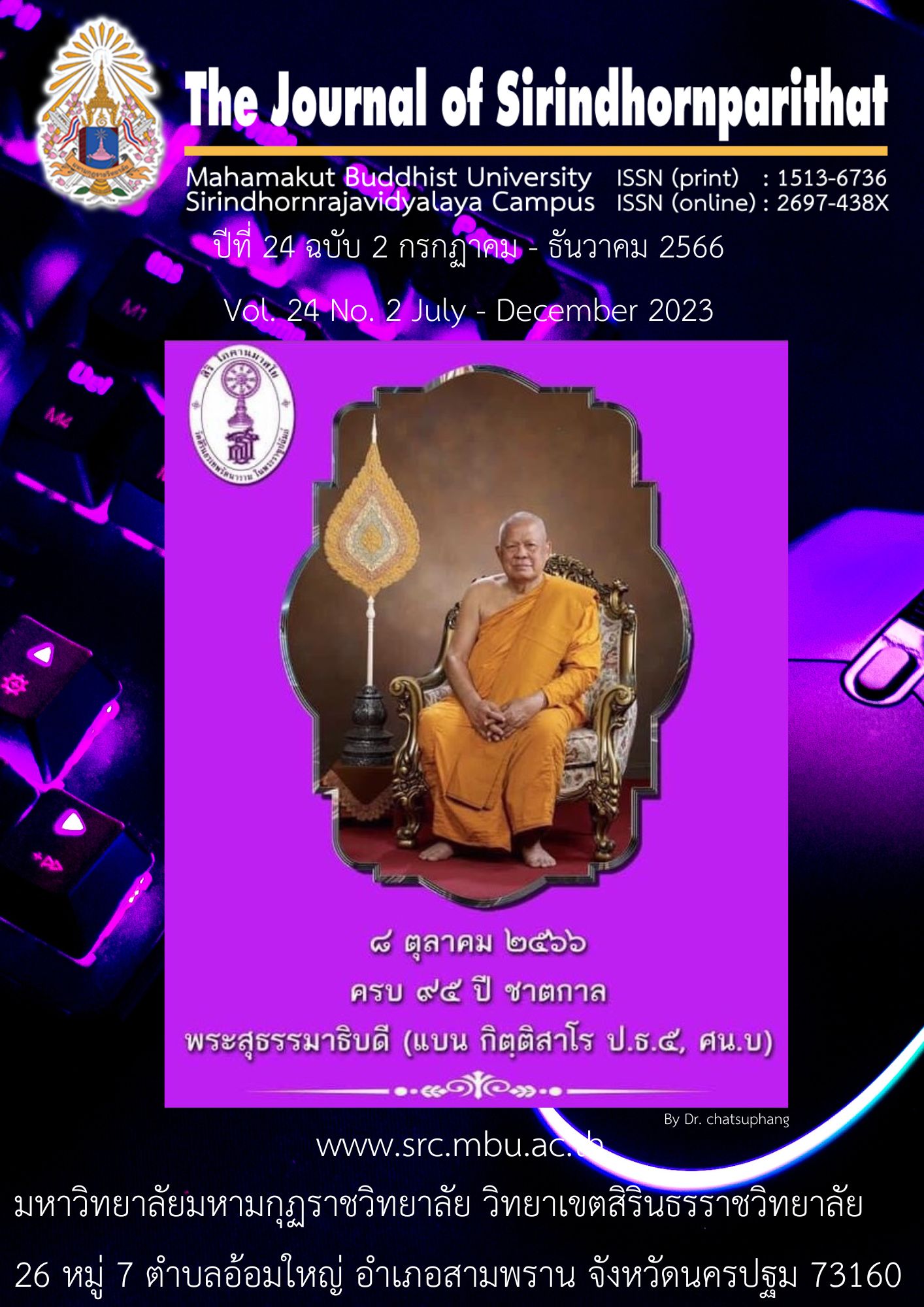The Emotional Intelligence of School Administrators Affecting Teacher’s Performance Under Bangkok Metropolitan, Northern Krung Thon Group
Keywords:
emotional intelligence of school administrators, teacher’s performanceAbstract
The purposes of this research were to 1) The level of emotional intelligence of school administrators under Bangkok metropolitan, northern Krungthon group; 2) The level of the teacher’s performance under Bangkok metropolitan, northern Krungthon group.; and 3) The emotional intelligence of school administrators affecting teacher’s performance under Bangkok metropolitan, northern Krung Thon group. The sample of this study were 70 schools under Bangkok metropolitan, northern KrungThon group. The respondents were school administrators, teachers, head of personnel administration subdivisions total 350 persons. The research instrument was a questionnaire with the content validity was measured by Index of item - objective congruence: IOC the value between 0.80-1.00 and the reliability of 0.987. The statistic used for analyzing were the percentage, mean, standard deviation, Pearson product moment correlation and stepwise multiple regression analysis.
Research findings:
- The level of emotional intelligence of school administrators under Bangkok metropolitan, northern KrungThon group were high overall, including self-motivation, self-awareness, self-regulation, social skills, and empathy.
- The level of the teacher’s performance under Bangkok metropolitan, northern KrungThon group were high overall, including additional teacher duties, classroom management, self and professional developments, and teaching methods.
- The emotional intelligence of school administrators affecting teacher’s performance under Bangkok metropolitan, northern KrungThon group were self-motivation. The multiple correlation coefficient of standard variable and predictive variable was .540, the prediction power level of 29.2 %, and the predictive error was .328, had significant at .01 levels. The regression equations in raw scores and the standard score were
= 2.490 + 0.257X3
= .540Z3
References
การศึกษาขั้นพื้นฐาน. (2552). คู่มือการปฏิบัติงานข้าราชการครู. กรุงเทพมหานคร: สำนักงานคณะกรรมการการศึกษาขั้นพื้นฐาน.
ณัฐณิชา ติยะศาศวัต. (2563). ความสัมพันธ์ระหว่างความฉลาดทางอารมณ์กับภาวะผู้นำการเปลี่ยนแปลงของผู้บริหารสถานศึกษาสังกัด สำนักงานเขตพื้นที่การศึกษามัธยมศึกษา. วารสารรัชต์ภาคย์, 14(36): 197.
ถนอมศักดิ์ จิรายุสสวัสดิ์. (2556). EQ ดี ทำอะไรก็สำเร็จ. กรุงเทพมหานคร: พิมพ์ดีการพิมพ์.
เทอดศักดิ์ เดชคง. (2544). จากความฉลาดทางอารมณ์สู่สติและปัญญา. (พิมพ์ครั้งที่ 7). กรุงเทพมหานคร: มติชน.
นครินทร์ วนกิจไพบูลย์. (2562). ความฉลาดทางอารมณ์ ทักษะสำคัญของผู้นำในศตวรรษที่ 21. สืบค้นเมื่อพฤศจิกายน 7, 2564, จาก https://www.youtube.com/watch?v=HCZLeRm48sE.
บุญนิกร คำกองแก้ว, อนงค์ สระบัว. (2562). ความฉลาดทางอารมณ์ที่ส่งผลต่อการปฏิบัติงานตามเกณฑ์มาตรฐานการปฏิบัติงานของผู้บริหารสถานศึกษาสังกัดสานักงานเขตพื้นที่การศึกษามัธยมศึกษา เขต 9 จังหวัดนครปฐม. วารสารมนุษยศาสตร์และสังคมศาสตร์, 2: 48-51.
ราชกิจนุเบกษา. (2562). ข้อบังคับครุสภาว่าด้วยมาตรฐานวิชาชีพ (ฉบับที่ 4) พ.ศ. 2562. สืบค้นเมื่อ กันยายน 16, 2564, จาก http://www.ratchakitcha.soc.go.th/DATA/ PDF/2562/E/068/T_0018.PDF.
วิเชียร เกตุสิงห์. (2552). การศึกษาองค์ความรู้เกี่ยวกับคุณลักษณะของคนไทยที่พึงประสงค์ : ความฉลาดทางอารมณ์. กรุงเทพมหานคร: สำนักงานเลขาธิการสภาการศึกษา.
สาคร วัฒราช. (2554). สภาพการปฏิบัติงานตามเกณฑ์มาตรฐานวิชาชีพครูของข้าราชการครูที่มีวิทยฐานะ ชำนาญการพิเศษ สำนักงานเขตพื้นที่การศึกษาประถมศึกษา อุบลราชธานีเขต 3. วิทยานิพนธ์ปริญญาครุศาสตรมหาบัณฑิต สาขาวิชาการบริหารการศึกษา, มหาวิทยาลัยราชภัฎอุบลราชธานี.
อนันตชัย ศรโคตร. (2549). ชีวิตนี้ใช่ว่าจะมีแค่อย่างเดียว. กรุงเทพมหานคร: มาย แบ็งค็อค.
Bar-on,R. (1997). emotional quotient inventory: A measure of emotional intelligence. Toronto: Multi- Health System.
Jeanne Segal. (2008). The language of Emotional Intelligence. retrieved 7 June, 2021, from http://196.223.158.148/bitstream/handle/123456789/3288/.
John D. Mayer David R. Caruso. (2016). The Ability Model of Emotional Intelligence: Principles and Updates. retrieved 7 June, 2021, https://journals.sagepub.com/ doi/10.1177/1754073916639667.
Likert, Rensis. (1967). “The Method of Constructing and Attitude Scale”. In Reading in Fishbeic, M (Ed.), Attitude Theory and Measurement.
Moore, B. (2009, Summer). Emotional intelligence for school administrators: A priority for school reform? American Secondary Education, 37(3): 20-28.

Downloads
Published
Issue
Section
License
Copyright (c) 2023 Mahamakut Buddhist University

This work is licensed under a Creative Commons Attribution-NonCommercial-NoDerivatives 4.0 International License.
บทความที่ได้รับการตีพิมพ์เป็นลิขสิทธิ์ของ มหาวิทยาลัยมหามกุฏราชวิทยาลัย วิทยาเขตสิรินธรราชวิทยาลัย
ข้อความที่ปรากฏในบทความแต่ละเรื่องในวารสารวิชาการเล่มนี้เป็นความคิดเห็นส่วนตัวของผู้เขียนแต่ละท่านไม่เกี่ยวข้องกับหาวิทยาลัยมหามกุฏราชวิทยาลัย วิทยาเขตสิรินธรราชวิทยาลัย และคณาจารย์ท่านอื่นๆในมหาวิทยาลัยฯ แต่อย่างใด ความรับผิดชอบองค์ประกอบทั้งหมดของบทความแต่ละเรื่องเป็นของผู้เขียนแต่ละท่าน หากมีความผิดพลาดใดๆ ผู้เขียนแต่ละท่านจะรับผิดชอบบทความของตนเองแต่ผู้เดียว



